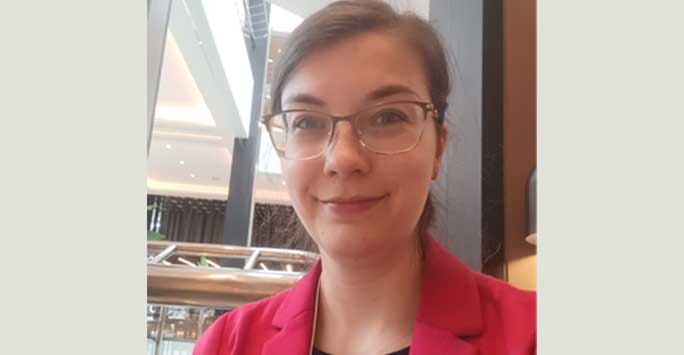
Dr Hillary Burlock is a British Academy Postdoctoral Fellow based in the Department of History. Her research traces the development of British assembly rooms from 1660 to 1880.
Here Hillary tells us all about her academic journey so far and her current research projects.
Listen to Hillary talk about her research in more detail in this podcast.
Background
As an eighteenth-century social and cultural historian, my research explores the connections between sociability, political culture, embodiment, and dance. I am particularly interested in the researching the tangled histories of British assembly rooms in the eighteenth and nineteenth centuries, drawing on this institution to broaden understandings of politics, performance, space, and place.
My doctoral thesis, ‘Politics and Pirouettes: the intersection of politics and social dance in late Georgian Britain’ (Queen Mary University of London, 2022), explored the symbiotic relationship between dance and political cultures from 1760 to 1832. It examined the relationship between the body, display, and dance within the context of court, party, electoral, local, and gender politics.
Bodily communication, identity, and the physical body informed and reflected wider cultural beliefs and practices in the eighteenth century, ultimately uncovering the place of culture in understanding politics and power. My first monograph, Dancing the Body Politic in Georgian England, based on this research is currently in preparation.
I have held fellowships at the Royal Archives at Windsor Castle, the Huntington Library in California, and the Lewis Walpole Library at Yale University where I was able to consult their rich archives of eighteenth-century diaries, correspondence, prints, and material culture, enhancing research for my book projects and articles (see the Journal for Eighteenth-Century Studies and The London Journal).
Digital histories
After completing my PhD in 2022, I joined the AHRC-funded Eighteenth-Century Political Participation and Electoral Culture (ECPPEC) project team led by Newcastle University and the University of Liverpool. Headed by Matthew Grenby and Elaine Chalus, this digital humanities project collected a wealth of information on English parliamentary elections from 1695 to the Reform Act of 1832, for which it received the BSECS Prize for Digital Resources in 2024.
It includes a complete list of all surviving poll books, transcribed and searchable data on how people voted, and essays and exhibitions featuring the rich visual, textual, and material culture generated by men, women, and children during electoral campaigns. I worked as a Postdoctoral Research Associate, writing feature essays on squib books, mock elections, processions and pageantry, election balls, and more, becoming immersed in the nuance of Georgian electoral culture. Working on this project was exciting, as I learned more about digital history tools and writing for public audiences.
In October 2024, I joined the School of Histories, Languages, and Cultures at the University of Liverpool as a British Academy Postdoctoral Fellow, working on my project, ‘Assembled, Disassembled, Reassembled: Britain’s Assembly Rooms, 1660-1880’. My book and digital history project traces the inception, zenith, and collapse of British assembly rooms between 1660 and 1880.
As spaces for dance, dalliance, and display, assembly rooms are the architectural eye candy to cinematic depictions of Georgian sociability today. Historically, they dominated social life yet, despite 935 surviving presently, we know surprisingly little about their origins, development, and proliferation.
My project combines detailed primary source research with innovative digital humanities methodologies to quantitatively map Britain’s assembly rooms and trace the trajectories, spread, architectural forms, and cultural functions. It also qualitatively analyses assembly rooms as multidimensional, multipurpose spaces that were significant to the broader democratisation of British leisure culture.
Heritage and public engagement
My interest in the stories and spaces of assembly rooms is longstanding, leading to a lot of public engagement work around Bath and its surviving assembly rooms over the past five years. In 2021, I co-organised the Bath 250 conference to mark the 250th anniversary of the opening of the Bath Assembly Rooms, now a National Trust site.
Developing from this conference, I co-edited Bath and Beyond, a collection of essays on the cultural influence of Bath’s assembly rooms in England and beyond to Europe and North America. These experiences also provided the opportunity to work as an academic advisor for the Bath Assembly Rooms redevelopment project, which will re-open the rooms to the public in 2027 with a new, immersive experience bringing the Georgian ballroom to life.
Alongside my academic work, I’m also very interested in public-facing work in heritage and public history, making my research accessible to everyone. I have led historical dance workshops in preparation for a Georgian-inspired fancy dress ball, and given public talks at the Jane Austen Festival, the West of England Costume Society, and Strictly Jane Austen Tours in Bath.
I’m also looking forward to sharing the colourful stories of these spaces at the York Georgian Festival and Buxton Georgian Festival in the coming months. Looking forward, I want my research to have a tangible impact, to shape conversations around heritage, conservation, and local history, as issues of repurposing and reuse of historic assembly rooms can guide their future use.